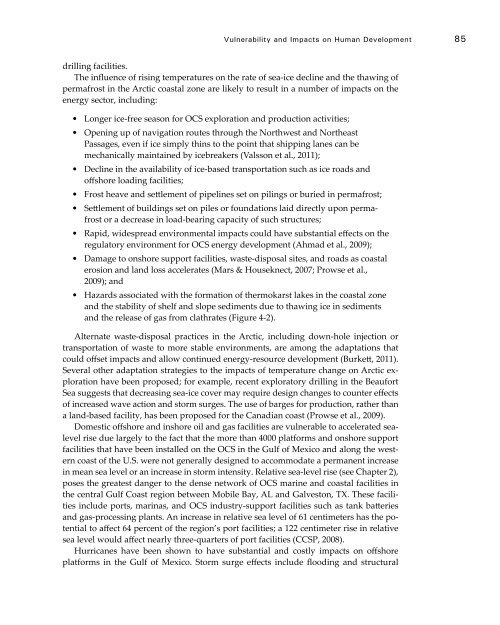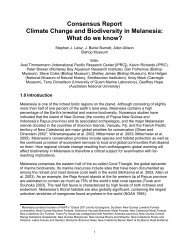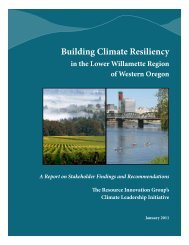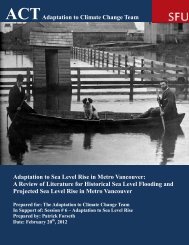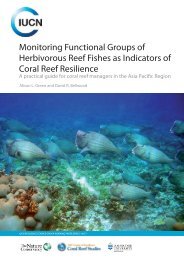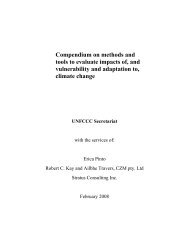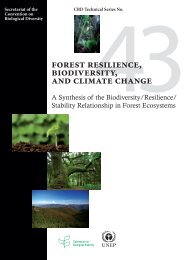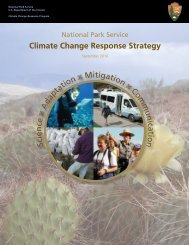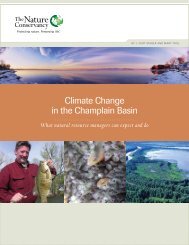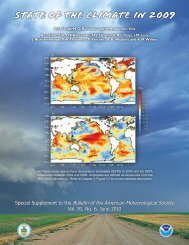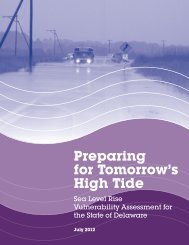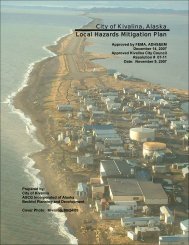Coastal Impacts, Adaptation, and Vulnerabilities - Climate ...
Coastal Impacts, Adaptation, and Vulnerabilities - Climate ...
Coastal Impacts, Adaptation, and Vulnerabilities - Climate ...
Create successful ePaper yourself
Turn your PDF publications into a flip-book with our unique Google optimized e-Paper software.
Vulnerability <strong>and</strong> <strong>Impacts</strong> on Human Development 85drilling facilities.The influence of rising temperatures on the rate of sea-ice decline <strong>and</strong> the thawing ofpermafrost in the Arctic coastal zone are likely to result in a number of impacts on theenergy sector, including:• Longer ice-free season for OCS exploration <strong>and</strong> production activities;• Opening up of navigation routes through the Northwest <strong>and</strong> NortheastPassages, even if ice simply thins to the point that shipping lanes can bemechanically maintained by icebreakers (Valsson et al., 2011);• Decline in the availability of ice-based transportation such as ice roads <strong>and</strong>offshore loading facilities;• Frost heave <strong>and</strong> settlement of pipelines set on pilings or buried in permafrost;• Settlement of buildings set on piles or foundations laid directly upon permafrostor a decrease in load-bearing capacity of such structures;• Rapid, widespread environmental impacts could have substantial effects on theregulatory environment for OCS energy development (Ahmad et al., 2009);• Damage to onshore support facilities, waste-disposal sites, <strong>and</strong> roads as coastalerosion <strong>and</strong> l<strong>and</strong> loss accelerates (Mars & Houseknect, 2007; Prowse et al.,2009); <strong>and</strong>• Hazards associated with the formation of thermokarst lakes in the coastal zone<strong>and</strong> the stability of shelf <strong>and</strong> slope sediments due to thawing ice in sediments<strong>and</strong> the release of gas from clathrates (Figure 4-2).Alternate waste-disposal practices in the Arctic, including down-hole injection ortransportation of waste to more stable environments, are among the adaptations thatcould offset impacts <strong>and</strong> allow continued energy-resource development (Burkett, 2011).Several other adaptation strategies to the impacts of temperature change on Arctic explorationhave been proposed; for example, recent exploratory drilling in the BeaufortSea suggests that decreasing sea-ice cover may require design changes to counter effectsof increased wave action <strong>and</strong> storm surges. The use of barges for production, rather thana l<strong>and</strong>-based facility, has been proposed for the Canadian coast (Prowse et al., 2009).Domestic offshore <strong>and</strong> inshore oil <strong>and</strong> gas facilities are vulnerable to accelerated sealevelrise due largely to the fact that the more than 4000 platforms <strong>and</strong> onshore supportfacilities that have been installed on the OCS in the Gulf of Mexico <strong>and</strong> along the westerncoast of the U.S. were not generally designed to accommodate a permanent increasein mean sea level or an increase in storm intensity. Relative sea-level rise (see Chapter 2),poses the greatest danger to the dense network of OCS marine <strong>and</strong> coastal facilities inthe central Gulf Coast region between Mobile Bay, AL <strong>and</strong> Galveston, TX. These facilitiesinclude ports, marinas, <strong>and</strong> OCS industry-support facilities such as tank batteries<strong>and</strong> gas-processing plants. An increase in relative sea level of 61 centimeters has the potentialto affect 64 percent of the region’s port facilities; a 122 centimeter rise in relativesea level would affect nearly three-quarters of port facilities (CCSP, 2008).Hurricanes have been shown to have substantial <strong>and</strong> costly impacts on offshoreplatforms in the Gulf of Mexico. Storm surge effects include flooding <strong>and</strong> structural


